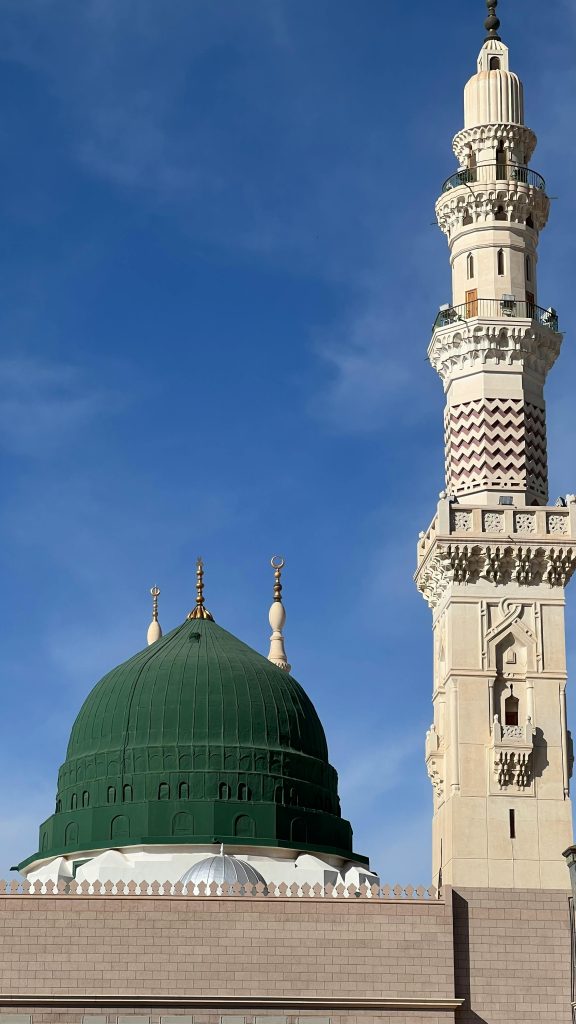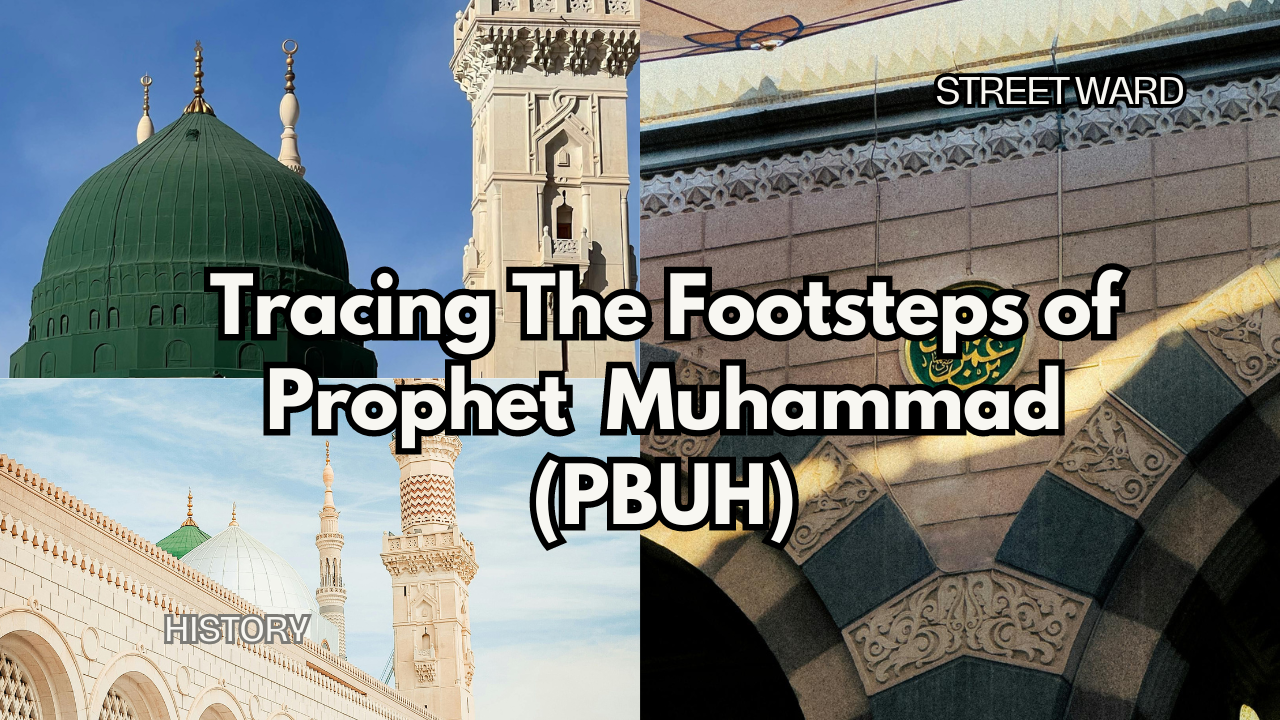Tracing the Footsteps of Prophet Muhammad (PBUH): A Historical Exploration (Islam)
Embark on a captivating historical excursion that retraces the path of Prophet Muhammad (PBUH) through time. Explore the intricate details of his life and teachings, revealing concealed treasures and captivating revelations. Prepare to be enlightened and motivated as we follow the footsteps of one of history’s most impactful individuals.
Introduction:-
Explaining the importance of Prophet Muhammad (PBUH) in Islam and the significance of tracing his historical journey.
Step back in time and embark on a historical journey to trace the footsteps of Prophet Muhammad (PBUH), the revered figure at the heart of Islam. Join us as we unravel the life, teachings, and impact of this influential individual who shaped the course of history. Let’s delve into his early beginnings, pivotal moments, and significant events that have left an indelible mark on believers worldwide. Get ready to immerse yourself in a captivating exploration of Prophet Muhammad’s (PBUH) remarkable legacy!

Background on Prophet Muhammad (PBUH)
Prophet Muhammad was born in Mecca around 570 CE, a time marked by social stratification and tribal rivalries in the Arabian Peninsula. He grew up orphaned but was known for his honesty, integrity, and wisdom, earning him the title of “Al-Amin” (the trustworthy) among his peers. At the age of 40, he received the first revelation from God through the Angel Gabriel, marking the beginning of his prophethood.
As the last prophet in Islam, Prophet Muhammad is seen as the final messenger who completed the teachings brought by earlier prophets such as Abraham, Moses, and Jesus. His role is pivotal in Islamic theology, emphasizing monotheism (belief in one God), social justice, and compassion.
Early Life of Prophet Muhammad (PBUH): Delving into his childhood and family background, including important events and influences.
The beginnings of Islam mark a pivotal moment in history, as the Quran was revealed to Prophet Muhammad (PBUH) by the Angel Gabriel. This divine message served as a guiding light for Muslims worldwide, emphasizing monotheism and moral principles.
In the early days of spreading the message, Prophet Muhammad (PBUH) faced resistance from Meccan leaders who felt threatened by his teachings. However, with unwavering faith and perseverance, he continued to preach compassion, justice, and equality.
As Islam gained momentum, more followers embraced its teachings and principles. The community grew stronger despite facing persecution and hardships. The early converts played a crucial role in propagating the message of peace and submission to one God.
The revelation of the Quran transformed Arabia’s social fabric, promoting unity among diverse tribes under one faith. It laid down laws that governed every aspect of life – from worship practices to societal norms – fostering a sense of community and solidarity among believers.
The Prophet Mohammad (PBUH) Said:-
“None of you should wish for death because of some harm that befalls him.If he must wish for death, let him say: ‘O Allah keep me alive so long as living is good for me and cause me to die when death is good for me “
The Migration to Medina: Discussing the Hijra and its impact on Islam:-
Imagine embarking on a journey that would change the course of history forever. This was the reality for Prophet Muhammad (PBUH) and his followers as they made their way from Mecca to Medina, seeking refuge and freedom to practice Islam.
The migration, known as the Hijra, marked a pivotal moment in Islamic history. It symbolized resilience, faith, and unwavering devotion to God’s will. Despite facing adversity and persecution in Mecca, the Prophet’s decision to migrate showcased his courage and determination.
Upon reaching Medina, Prophet Muhammad (PBUH) established a community based on unity, brotherhood, and justice. This laid the foundation for the growth and spread of Islam beyond Arabia’s borders.
The impact of this migration resonates through generations of Muslims worldwide. It serves as a reminder of faith’s power to overcome challenges and pave the way for a brighter future.
One of the significant impacts of the Hijra was the establishment of an Islamic state in Medina. This marked a shift from a purely religious movement to a political entity that governed its people according to Islamic principles. The Prophet (PBUH) served as both a spiritual leader and a political figure, setting an example for future Muslim rulers.
The impact of this migration resonates through generations of Muslims worldwide. It serves as a reminder of faith’s power to overcome challenges and pave the way for a brighter future.
One of the significant impacts of the Hijra was the establishment of an Islamic state in Medina. This marked a shift from a purely religious movement to a political entity that governed its people according to Islamic principles. The Prophet (PBUH) served as both a spiritual leader and a political figure, setting an example for future Muslim rulers.
The migration also led to the expansion of Islam beyond Mecca and Medina. As more people embraced Islam, the Muslim community grew in numbers and spread across Arabia and beyond. This would not have been possible without the safe haven and support provided by Medina.
Furthermore, the Hijra brought about social changes within Arab society. In Mecca, the pagan culture had prevailed, where tribal ties were given utmost importance. In contrast, in Medina, all Muslims were considered equal regardless of their tribe or social status. This laid the foundation for a more egalitarian society based on faith rather than lineage.
The Hijra also had economic implications as it opened up new trade routes between Mecca and Medina. The Prophet (PBUH) encouraged trade and commerce amongst Muslims, promoting economic growth within the community.
Moreover, the migration to Medina facilitated the spread of Islamic knowledge and teachings. The companions who migrated with the Prophet (P BUH) were able to learn directly from him and spread his teachings to others. This led to the establishment of Islamic schools and centers of learning in Medina, laying the groundwork for the development of Islamic scholarship.
In conclusion, the Hijra was a significant event that marked the beginning of a new era in Islam. It not only provided a safe haven for Muslims but also laid the foundations for an Islamic state, economic growth, social change, and the spread of Islamic knowledge. The lessons learned from this migration continue to inspire Muslims today, reminding them of the power of faith and perseverance in overcoming challenges and achieving great things.
Major Events in Medina: Highlighting significant:-
After settling in Medina, Prophet Muhammad (PBUH) continued to spread the message of Islam and establish a strong community based on faith and unity. Some major events during this time included the Battle of Badr, the Treaty of Hudaybiyyah, and the Conquest of Mecca. These events shaped the future of Islam and solidified its place in history.
Conclusion:-
Prophet Muhammad’s historical journey is not merely a chapter in Islamic history but a beacon of guidance for all humanity. Understanding his life provides insights into the origins of Islam and the principles that underpin this global faith. By reflecting on his teachings, we can aspire to cultivate virtues of compassion, justice, and humility in our own lives. Let us continue to explore and learn from the profound legacy of Prophet Muhammad, seeking wisdom and inspiration in his example.
Additional Resources:-
For readers interested in delving deeper into the historical journey of Prophet Muhammad (PBUH), here are some recommended resources:
- The Life of Muhammad by Ibn Ishaq
- Muhammad: His Life Based on the Earliest Sources by Martin Lings
- The Sealed Nectar by Safi-ur-Rahman al-Mubarakpuri







